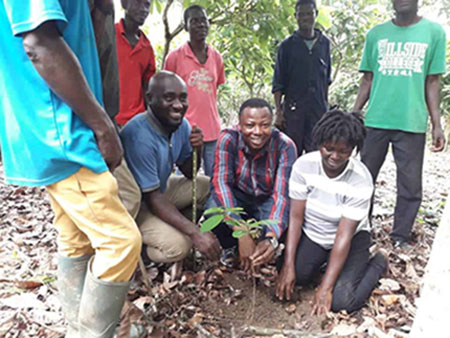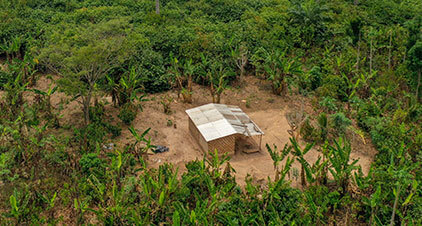ASASE: A landscape approach to supporting sustainable cocoa
Natural forests capture carbon dioxide, increase biodiversity, and improve soil quality, providing ecosystem services that entire communities benefit from. For Ghana's 800,000 cocoa-farming households however, the country's high risk of deforestation brings with it the threat of lower, less reliable rainfall and rising temperatures that could damage cocoa trees, reducing yields and household incomes.
At the end of last year, the public sector, private sector and civil society organization partners jointly began the inception phase of a new project, working towards a climate-smart cocoa sector where forests and natural ecosystems can thrive alongside sustainable cocoa production. This project is called ASASE, which stands for Accessible Soils and Sustainable Environments and also means "land" in the local Ghanaian language Twi. Over the next four years, this 2.3 million Euro project funded by the Netherlands Enterprise Agency (RVO), Export Trading Group (ETG), and chocolate makers, will work with 5,000 farmers in Ghana's Ashanti and Eastern regions to tackle deforestation, rehabilitate aging cocoa farms, and restore natural forests.
A landscape approach
ASASE moves away from the traditional focus on the direct supply chain and instead intervenes on three levels: working together with cocoa farmers, their rural communities, and in local forest remnants. By tackling whole geographic areas rather than focusing solely on cocoa, we can ensure that problems such as deforestation are not simply pushed into other commodity supply chains.
Farmers will receive sensitizations and trainings on agroforestry practices, as well as land and tree tenure documentation certificates. It has been shown that farmers with land tenure rights are able to invest in their farms without fear of losing the fruit of their work, leading to higher performing farms and improved long-term security.
Further, the project will facilitate the conservation of forests and the reforestation of degraded areas through approaches such as payment for ecosystem services, where farmers receive value in return for their efforts to protect or even rebuild forests around their cocoa farms.
Strong partnerships
ASASE brings together national and international partners.
West Africa’s land rights specialist Meridia, dedicated to securing affordable land rights for smallholder farmers at scale, has spent the past five years developing the highly successful FarmSeal and TreeSeal tools for the Ghanaian context. With ASASE, they will be working to provide farmers with land and tree tenure rights through customary certificates.
Meanwhile, civil society organization TropenBos Ghana brings a wealth of technical expertise in the development of environmental trainings for farmers, as well as their extensive local network.
From the public sector, the Ghanaian Ministry of Lands and Natural Resources (MLNR) will work to ensure the project aligns with national policy such as REDD+ and will use the outcomes to develop future policies to ensure the longevity of this important work.
Finally, leading the partnership, is commodity trading house and WCF member ETG and their associated sustainability foundation Beyond Beans (formerly Cocoanect), whose leadership team bring over 25 years of experience working in sustainability in the cocoa sector.
Building on Cocoa & Forests Initiative targets
Bringing together diverse national and international stakeholders is an important step towards creating an environmentally sustainable cocoa sector, building on the existing sector-wide Cocoa & Forests Initiative'sefforts to end deforestation and restore forest areas. The landscape approach and documentation of land and tree rights to make cocoa production more sustainable in the long term demonstrate ASASE’s particularly innovative approach to driving long-lasting change.
With this joint effort, the project is designed to create maximum impact at all levels, paving the way for a cocoa sector where cocoa farming can thrive alongside Ghana's natural environment.




